冀教版英语九年级下Unit 9 Communication Lesson 49 Get Along with Others课件+嵌入音频(31张PPT )
文档属性
| 名称 | 冀教版英语九年级下Unit 9 Communication Lesson 49 Get Along with Others课件+嵌入音频(31张PPT ) | 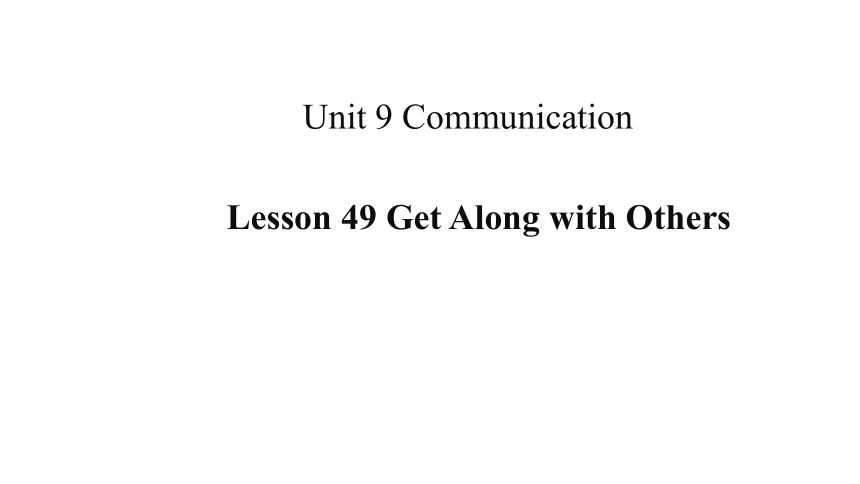 | |
| 格式 | pptx | ||
| 文件大小 | 7.8MB | ||
| 资源类型 | 教案 | ||
| 版本资源 | 冀教版 | ||
| 科目 | 英语 | ||
| 更新时间 | 2022-01-04 23:04:19 | ||
图片预览

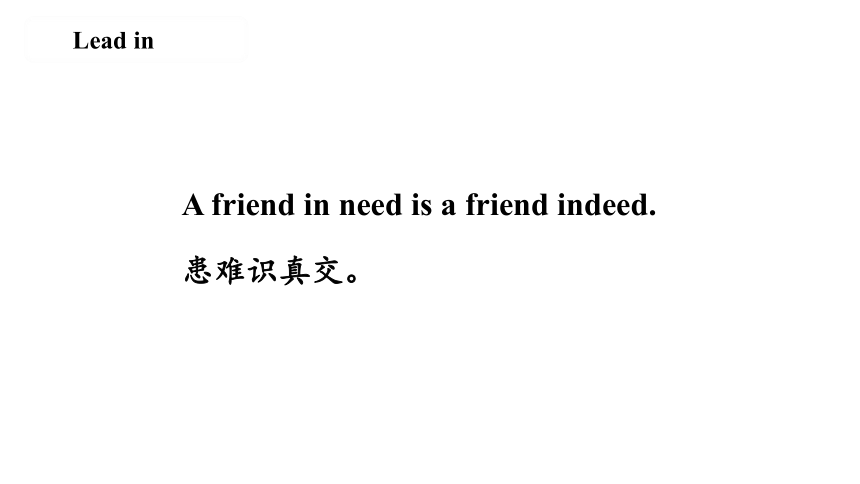


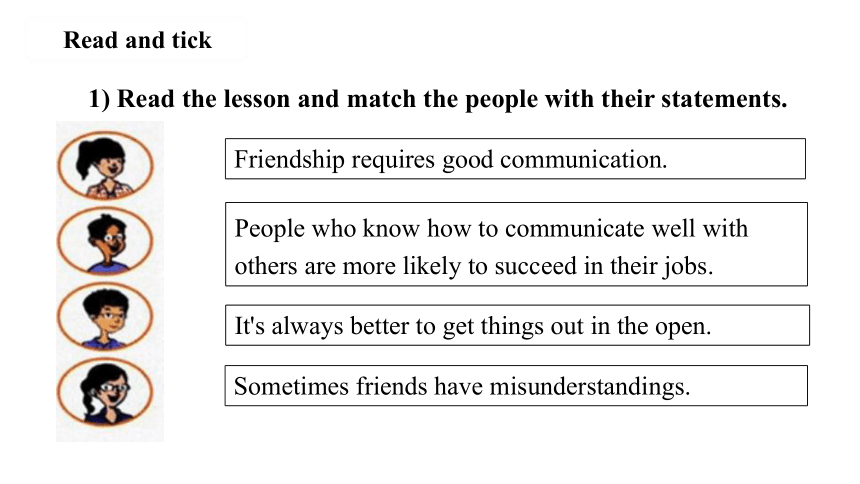
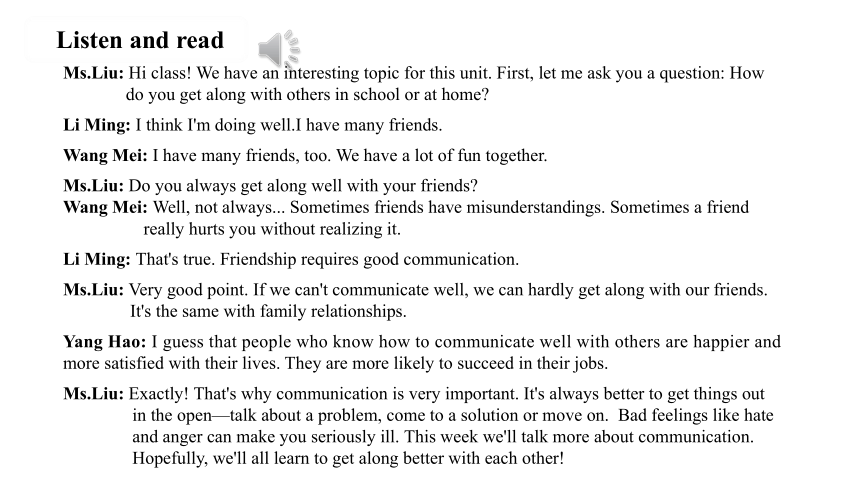
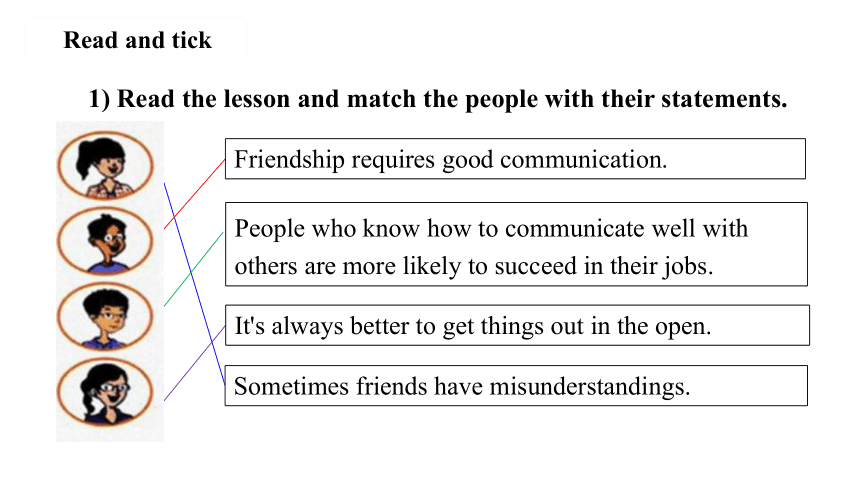
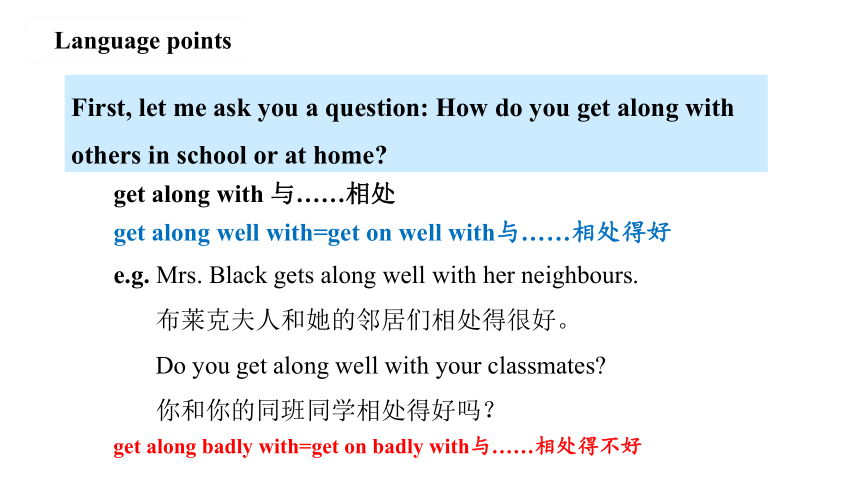

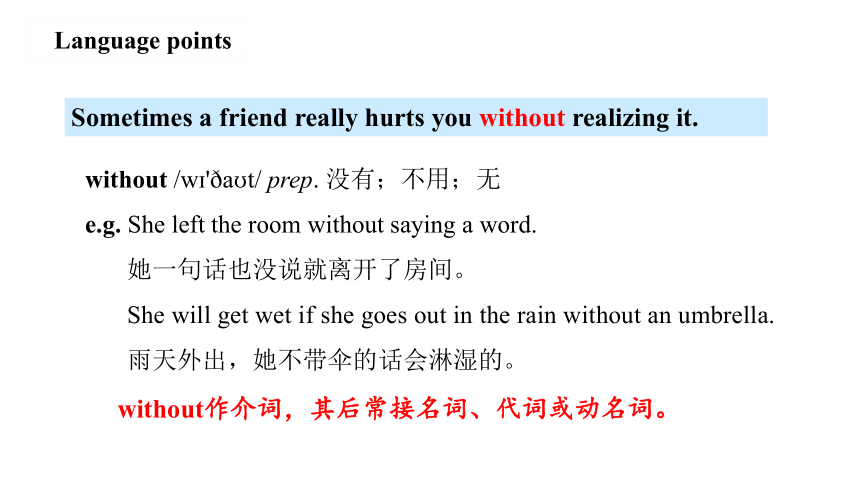
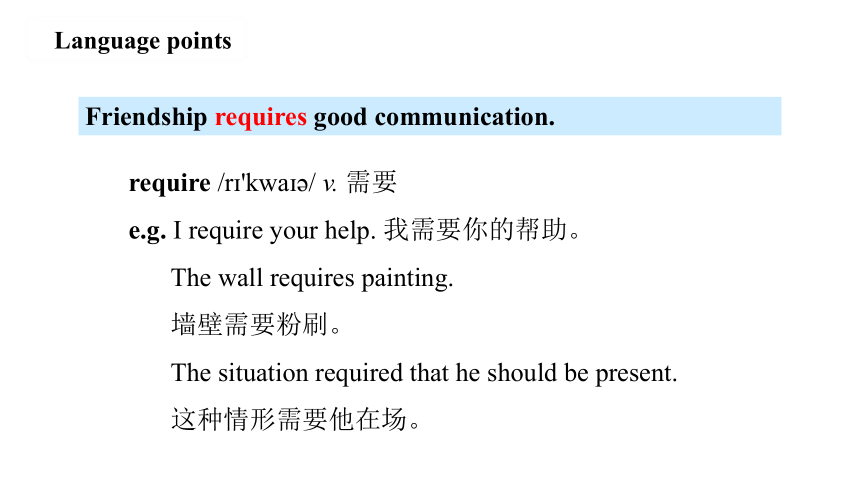
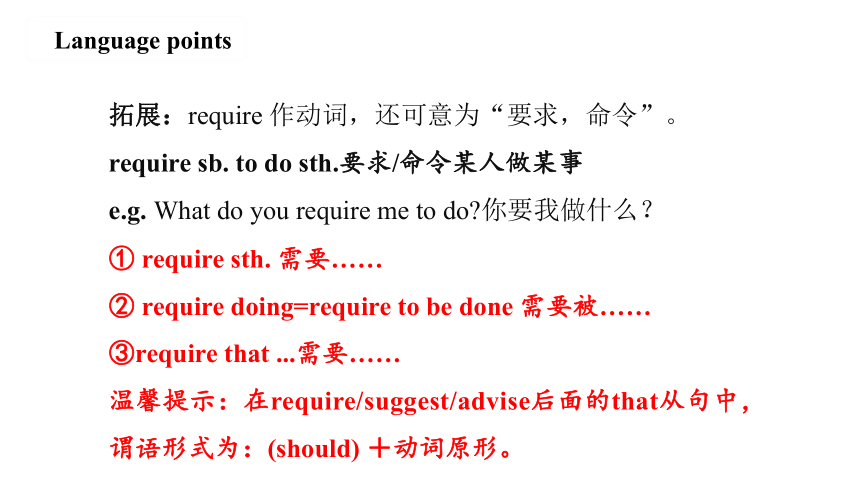
文档简介
(共31张PPT)
Unit 9 Communication
Lesson 49 Get Along with Others
Lead in
A friend in need is a friend indeed.
患难识真交。
They are all friends. They have good relationships.
Do you know how to get along with people around you
Lead in
Think About It!
·Do you have good relationships with the people in your life
·What do you think is most important for a good friendship
1) Read the lesson and match the people with their statements.
Friendship requires good communication.
People who know how to communicate well with others are more likely to succeed in their jobs.
It's always better to get things out in the open.
Sometimes friends have misunderstandings.
Read and tick
Ms.Liu: Hi class! We have an interesting topic for this unit. First, let me ask you a question: How do you get along with others in school or at home
Li Ming: I think I'm doing well.I have many friends.
Wang Mei: I have many friends, too. We have a lot of fun together.
Ms.Liu: Do you always get along well with your friends
Wang Mei: Well, not always... Sometimes friends have misunderstandings. Sometimes a friend
really hurts you without realizing it.
Li Ming: That's true. Friendship requires good communication.
Ms.Liu: Very good point. If we can't communicate well, we can hardly get along with our friends.
It's the same with family relationships.
Yang Hao: I guess that people who know how to communicate well with others are happier and more satisfied with their lives. They are more likely to succeed in their jobs.
Ms.Liu: Exactly! That's why communication is very important. It's always better to get things out in the open—talk about a problem, come to a solution or move on. Bad feelings like hate and anger can make you seriously ill. This week we'll talk more about communication. Hopefully, we'll all learn to get along better with each other!
Listen and read
1) Read the lesson and match the people with their statements.
Friendship requires good communication.
People who know how to communicate well with others are more likely to succeed in their jobs.
It's always better to get things out in the open.
Sometimes friends have misunderstandings.
Read and tick
First, let me ask you a question: How do you get along with
others in school or at home
get along with 与……相处
get along well with=get on well with与……相处得好
e.g. Mrs. Black gets along well with her neighbours.
布莱克夫人和她的邻居们相处得很好。
Do you get along well with your classmates
你和你的同班同学相处得好吗?
Language points
get along badly with=get on badly with与……相处得不好
拓展:get along/on (with) 还可意为“(工作情况等的) 进展”,后面跟物。
e.g. This matter is getting along/on smoothly.
这件事情进展很顺利。
Language points
Sometimes a friend really hurts you without realizing it.
without /w ' a t/ prep. 没有;不用;无
e.g. She left the room without saying a word.
她一句话也没说就离开了房间。
She will get wet if she goes out in the rain without an umbrella. 雨天外出,她不带伞的话会淋湿的。
without作介词,其后常接名词、代词或动名词。
Language points
Friendship requires good communication.
require /r 'kwa / v. 需要
e.g. I require your help. 我需要你的帮助。
The wall requires painting.
墙壁需要粉刷。
The situation required that he should be present.
这种情形需要他在场。
Language points
拓展:require 作动词,还可意为“要求,命令”。
require sb. to do sth.要求/命令某人做某事
e.g. What do you require me to do 你要我做什么?
① require sth. 需要……
② require doing=require to be done 需要被……
③require that ...需要……
温馨提示:在require/suggest/advise后面的that从句中,谓语形式为:(should) +动词原形。
Language points
communication /k mju n 'ke n/ n. 交流;沟通
① have communication with ... 和……交流
② be in communication with sb. by sth.通过……与某人联系
e.g. I am in communication with my old friends by WeChat.
我和我的老朋友们通过微信联系。
David had close communication with his Chinese friends.
戴维和他的中国朋友们交流密切。
Language points
拓展:communication 的动词形式为communicate,意为“沟通;交流”。
communicate with...与……交流
communicate sth. to sb.向某人传达某事
e.g. Can you communicate with the dog by gesture
你能用手势跟这只狗交流吗?
Language points
If we can’t communicate well, we can hardly get along
with our friends.
hardly /'hɑ dl / adv. 几乎不;几乎没有
e.g. He is very shy and hardly talks with others.
他很腼腆,几乎不与其他人交谈。
They can hardly remember the little girl, can they
他们几乎记不起这个小女孩,是吗?
Language points
辨析:hardly 与hard
hardly adv. 几乎不。
hard adj. 难懂的;adv. 努力地。
e.g. He works hard. 他努力工作。
He hardly works. 他几乎不工作。
Language points
It’s the same with family relationships.
It is/was the same with... ……也是一样的。
e.g. —I talk much about communication every day.
我每天谈论很多有关沟通的事。
—It is the same with me. /So it is with me. /So do I.
我也是。
Language points
—I didn’t finish my task yesterday.
昨天我没有完成我的任务。
—It was the same with me. /So it was with me. /Neither did I.
我也是。
Language points
“我也一样(不)”的各种表达:
It is the same with me.
So it is with me.
So do/can/am I.
Neither do/can/am I.
Language points
They are more likely to succeed in their jobs.
likely /'la kli/ adj. 可能的
①be likely to do sth. 可能做某事
②It is likely that... 可能……
e.g. It is likely that he won’t come. It is too late.
他可能不会来了。天太晚了。
He is more likely to go traveling with me.
他更有可能和我一起去旅游。
Language points
succeed /s k'si d/ v. 成功
succeed in doing sth. 在(做)某事上取得成功
e.g. He succeeded in getting a place at art school.
他被艺术学校录取了。
Work hard, and you will succeed.
努力工作,你会成功的。
Nothing succeeds like success. 一事成,百事顺。
Language points
It’s always better to get things out in the open — talk about a
problem, come to a solution or move on.
solution /s 'lu n/ n. 解决办法;答案
e.g. I hope you can come up with a better solution.
我希望你能想出一个更好的解决办法。
It was only a partial solution to the problem.
那只是部分地解决了这个问题。
Language points
拓展:solution 的动词形式为solve,意为“解决;解答”。solve the problem“解决问题”,相当于find a solution to the problem,意为“找到问题的解决方法”。
① come to a solution 得出解决方案;得出解答
② the solution to...……的解决方法
Language points
Bad feelings like hate and anger can make you seriously ill.
anger /' ɡ / n. 怒;怒火;怒气
① be angry with/at sb.生某人的气
② be angry at sth.对某事感到生气
e.g. Please don’t be angry with/at me. It’s not my fault.
请别冲我发脾气,这不是我的错。
in anger相当于angrily,在句中作状语。
e.g. He spoke in anger. 他怒气冲冲地说。
Language points
Bad feelings like hate and anger can make you seriously ill.
anger 的词形变化:
angry(adj. 生气的)
anger(n.)
angrily(adv. 生气地)
Language points
2) Rewrite the sentences below with the correct forms of the phrases from the lesson.
1. It took them more than an hour to solve the problem.
→It took them more than an hour to __________________
________________________________________________.
2. We had a wonderful time in the park.
→We had ________ in the park.
come to a solution
fun
to the problem
Let’s Do It!
3) Change the following adjectives into adverbs and use them to complete the sentences.
1. Using the search engines, you can ________ find books in this library.
2. Here is a book on grammar. _________, it will help you with your study.
easy________ hopeful________ exact________ real________ serious________
easily
hopefully
exactly
really
seriously
easily
Hopefully
Let’s Do It!
3. The old lady walked ________ slowly.It took her a long time to get there.
4. I'm sorry to hear that.Was she ___________hurt
5. Jim must have copied Paul's work because they made ________ the same mistakes.
really
seriously
exactly
Let’s Do It!
4) Work in groups . Share your ideas about communication. You can use “I think...”, “I guess...”, “That's for sure! ”, “That's true! ” or “Good point! ”.
Let’s Do It!
本节课我们主要学习了以下重点内容:
(1) 重点单词: require, hardly, succeed
(2) 重点短语: get along with
(3) 重点句式: It’s the same with…
Summary
Unit 9 Communication
Lesson 49 Get Along with Others
Lead in
A friend in need is a friend indeed.
患难识真交。
They are all friends. They have good relationships.
Do you know how to get along with people around you
Lead in
Think About It!
·Do you have good relationships with the people in your life
·What do you think is most important for a good friendship
1) Read the lesson and match the people with their statements.
Friendship requires good communication.
People who know how to communicate well with others are more likely to succeed in their jobs.
It's always better to get things out in the open.
Sometimes friends have misunderstandings.
Read and tick
Ms.Liu: Hi class! We have an interesting topic for this unit. First, let me ask you a question: How do you get along with others in school or at home
Li Ming: I think I'm doing well.I have many friends.
Wang Mei: I have many friends, too. We have a lot of fun together.
Ms.Liu: Do you always get along well with your friends
Wang Mei: Well, not always... Sometimes friends have misunderstandings. Sometimes a friend
really hurts you without realizing it.
Li Ming: That's true. Friendship requires good communication.
Ms.Liu: Very good point. If we can't communicate well, we can hardly get along with our friends.
It's the same with family relationships.
Yang Hao: I guess that people who know how to communicate well with others are happier and more satisfied with their lives. They are more likely to succeed in their jobs.
Ms.Liu: Exactly! That's why communication is very important. It's always better to get things out in the open—talk about a problem, come to a solution or move on. Bad feelings like hate and anger can make you seriously ill. This week we'll talk more about communication. Hopefully, we'll all learn to get along better with each other!
Listen and read
1) Read the lesson and match the people with their statements.
Friendship requires good communication.
People who know how to communicate well with others are more likely to succeed in their jobs.
It's always better to get things out in the open.
Sometimes friends have misunderstandings.
Read and tick
First, let me ask you a question: How do you get along with
others in school or at home
get along with 与……相处
get along well with=get on well with与……相处得好
e.g. Mrs. Black gets along well with her neighbours.
布莱克夫人和她的邻居们相处得很好。
Do you get along well with your classmates
你和你的同班同学相处得好吗?
Language points
get along badly with=get on badly with与……相处得不好
拓展:get along/on (with) 还可意为“(工作情况等的) 进展”,后面跟物。
e.g. This matter is getting along/on smoothly.
这件事情进展很顺利。
Language points
Sometimes a friend really hurts you without realizing it.
without /w ' a t/ prep. 没有;不用;无
e.g. She left the room without saying a word.
她一句话也没说就离开了房间。
She will get wet if she goes out in the rain without an umbrella. 雨天外出,她不带伞的话会淋湿的。
without作介词,其后常接名词、代词或动名词。
Language points
Friendship requires good communication.
require /r 'kwa / v. 需要
e.g. I require your help. 我需要你的帮助。
The wall requires painting.
墙壁需要粉刷。
The situation required that he should be present.
这种情形需要他在场。
Language points
拓展:require 作动词,还可意为“要求,命令”。
require sb. to do sth.要求/命令某人做某事
e.g. What do you require me to do 你要我做什么?
① require sth. 需要……
② require doing=require to be done 需要被……
③require that ...需要……
温馨提示:在require/suggest/advise后面的that从句中,谓语形式为:(should) +动词原形。
Language points
communication /k mju n 'ke n/ n. 交流;沟通
① have communication with ... 和……交流
② be in communication with sb. by sth.通过……与某人联系
e.g. I am in communication with my old friends by WeChat.
我和我的老朋友们通过微信联系。
David had close communication with his Chinese friends.
戴维和他的中国朋友们交流密切。
Language points
拓展:communication 的动词形式为communicate,意为“沟通;交流”。
communicate with...与……交流
communicate sth. to sb.向某人传达某事
e.g. Can you communicate with the dog by gesture
你能用手势跟这只狗交流吗?
Language points
If we can’t communicate well, we can hardly get along
with our friends.
hardly /'hɑ dl / adv. 几乎不;几乎没有
e.g. He is very shy and hardly talks with others.
他很腼腆,几乎不与其他人交谈。
They can hardly remember the little girl, can they
他们几乎记不起这个小女孩,是吗?
Language points
辨析:hardly 与hard
hardly adv. 几乎不。
hard adj. 难懂的;adv. 努力地。
e.g. He works hard. 他努力工作。
He hardly works. 他几乎不工作。
Language points
It’s the same with family relationships.
It is/was the same with... ……也是一样的。
e.g. —I talk much about communication every day.
我每天谈论很多有关沟通的事。
—It is the same with me. /So it is with me. /So do I.
我也是。
Language points
—I didn’t finish my task yesterday.
昨天我没有完成我的任务。
—It was the same with me. /So it was with me. /Neither did I.
我也是。
Language points
“我也一样(不)”的各种表达:
It is the same with me.
So it is with me.
So do/can/am I.
Neither do/can/am I.
Language points
They are more likely to succeed in their jobs.
likely /'la kli/ adj. 可能的
①be likely to do sth. 可能做某事
②It is likely that... 可能……
e.g. It is likely that he won’t come. It is too late.
他可能不会来了。天太晚了。
He is more likely to go traveling with me.
他更有可能和我一起去旅游。
Language points
succeed /s k'si d/ v. 成功
succeed in doing sth. 在(做)某事上取得成功
e.g. He succeeded in getting a place at art school.
他被艺术学校录取了。
Work hard, and you will succeed.
努力工作,你会成功的。
Nothing succeeds like success. 一事成,百事顺。
Language points
It’s always better to get things out in the open — talk about a
problem, come to a solution or move on.
solution /s 'lu n/ n. 解决办法;答案
e.g. I hope you can come up with a better solution.
我希望你能想出一个更好的解决办法。
It was only a partial solution to the problem.
那只是部分地解决了这个问题。
Language points
拓展:solution 的动词形式为solve,意为“解决;解答”。solve the problem“解决问题”,相当于find a solution to the problem,意为“找到问题的解决方法”。
① come to a solution 得出解决方案;得出解答
② the solution to...……的解决方法
Language points
Bad feelings like hate and anger can make you seriously ill.
anger /' ɡ / n. 怒;怒火;怒气
① be angry with/at sb.生某人的气
② be angry at sth.对某事感到生气
e.g. Please don’t be angry with/at me. It’s not my fault.
请别冲我发脾气,这不是我的错。
in anger相当于angrily,在句中作状语。
e.g. He spoke in anger. 他怒气冲冲地说。
Language points
Bad feelings like hate and anger can make you seriously ill.
anger 的词形变化:
angry(adj. 生气的)
anger(n.)
angrily(adv. 生气地)
Language points
2) Rewrite the sentences below with the correct forms of the phrases from the lesson.
1. It took them more than an hour to solve the problem.
→It took them more than an hour to __________________
________________________________________________.
2. We had a wonderful time in the park.
→We had ________ in the park.
come to a solution
fun
to the problem
Let’s Do It!
3) Change the following adjectives into adverbs and use them to complete the sentences.
1. Using the search engines, you can ________ find books in this library.
2. Here is a book on grammar. _________, it will help you with your study.
easy________ hopeful________ exact________ real________ serious________
easily
hopefully
exactly
really
seriously
easily
Hopefully
Let’s Do It!
3. The old lady walked ________ slowly.It took her a long time to get there.
4. I'm sorry to hear that.Was she ___________hurt
5. Jim must have copied Paul's work because they made ________ the same mistakes.
really
seriously
exactly
Let’s Do It!
4) Work in groups . Share your ideas about communication. You can use “I think...”, “I guess...”, “That's for sure! ”, “That's true! ” or “Good point! ”.
Let’s Do It!
本节课我们主要学习了以下重点内容:
(1) 重点单词: require, hardly, succeed
(2) 重点短语: get along with
(3) 重点句式: It’s the same with…
Summary
同课章节目录
- Unit 7 Work for Peace
- Lesson 37 Don't Fight!
- Lesson 38 Making School a Better Place
- Lesson 39 The Dove and the Olive Branch
- Lesson 40 The UN—Power of Words
- Lesson 41 Jenny's Good Advice
- Lesson 42 Peace at Last
- Unit Review
- Unit 8 Culture Shapes Us
- Lesson 43 A Visit to Chinatown
- Lesson 44 Popular Sayings
- Lesson 45 Different Manners
- Lesson 46 Home to Many Cultures
- Lesson 47 Good Manners
- Lesson 48 Supper with the Bradshaws
- Unit Review
- Unit 9 Communication
- Lesson 49 Get Along with Others
- Lesson 50 Tips for Good Communication
- Lesson 51 What Could Be Wrong?
- Lesson 52 The Power of a Smile
- Lesson 53 Working in Groups
- Lesson 54 How Embarrassing!
- Unit Review
- Unit 10 Get Ready for the Future
- Lesson 55 Look into the Future
- Lesson 56 Manage Your Time
- Lesson 57 Best Wishes
- Lesson 58 Ms.Liu's Speech
- Lesson 59 Keep Your Choices Open
- Lesson 60 Get a Good Education
- Unit Review
